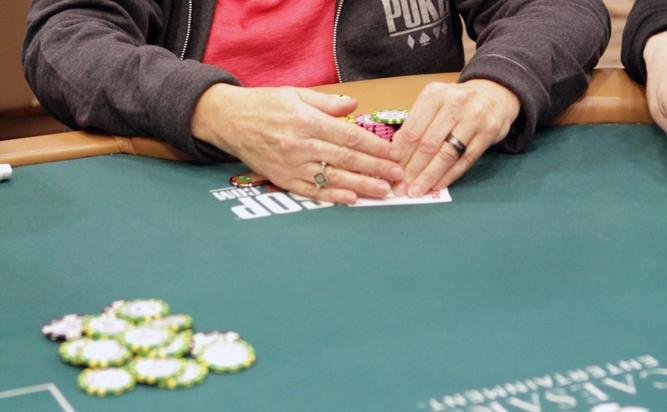By Susana Gómez Báez
The problem wasn’t that she was crying; the problem was she couldn’t stop crying.
Tammy Landau had spent the past week on a poker cruise. She had played steadily since day one, quietly and carefully observing her opponents.
Thick Glasses Grouch had claimed to be visually impaired but played his hands without any trouble. ABC Player – whom Landau nicknamed for his predictable game – fancied himself a great player because he was a tournament director in Las Vegas. Both men had been making fun of Landau’s game all week.
She still beat them.
On the last night, she hit two big hands in a row, busting out Thick Glasses Grouch and ABC Player one after the other. Still, as they walked away and Landau racked in her winnings, she broke down in tears.
“They just wore me down out of disrespect,” she says. “There’s no crying in poker. That’s the last time I did that and I hope it never happens again.”
That was three years ago.
Since then, Landau has gone as far as the World Series of Poker (WSOP) – an annual 62-tournament event in Las Vegas that hosts a Main Event with a $10,000 buyin.
She played at the $1,000-buy-in Women’s Event.
But that’s a life her students don’t know. Landau has been a Ryerson criminal justice professor since 1998.
She began playing poker 10 years ago, when the game became popular on television after an unknown accountant from Texas won the main event at the WSOP.
“The word spread that poker was something anyone could do,” says Landau. “That’s when I started paying attention to it.” She took to organizing home games where she and her friends “pretended [they] knew how to play as an excuse to socialize.” It wasn’t until 2007, when she started having serious health issues, that she began taking poker seriously.
It was the only thing that distracted her from her worries.
“Poker helped keep me focused and keep me in a different place,” she says. “When you’re at a poker table and you want to do well, nothing else can exist.” In fact, she insists that if she had started taking the game seriously earlier in her life, she would’ve probably made it a professional career. According to her, it’s much harder than people think.
“It’s very romantic to think about playing poker all the time,” she says. “But you have to be grinding away all the time. You have to be able to play poker seven hours a day. They say it’s a hard way to make an easy living.”
She sees why many people might be skeptical about a career in poker, but to her it’s not a risk because she doesn’t consider the game a gamble.
“It’s not a game of chance, but rather of strategy,” she says. “I certainly get the gamble because hitting big is very exciting… and it can appeal to the gambler in people.
But those are the people who are going to essentially lose.” Plus, she says the stigma labelling casino games as instigators of “gambling addiction” is very hypocritical.
“We already have people who have very serious addictions to alcohol and tobacco and the provincial government is already involved in gaming through lotteries, through bingo,” she says. “To isolate casinos and poker and slot machines as the demon that’s set aside from everything else is very disingenuous.”
In fact, she says the poker community is very charitable. WSOP, despite having the largest prize pool of any sporting event in the world, raised $10 million last year for an organization that promotes accessibility to clean water. This generosity is a trait Landau shares.
In 2007, she began hosting her own tournament to raise money for the Princess Margaret Hospital. What began with 35 participants – mostly comprised of supportive friends acting as dealers – has turned into an annual event for about 55 beginners.
So far, the Queen’s Full tournament has raised $25,000.
Landau would be more than happy to host a fund raiser poker tournament for Ryerson students.
According to her, it would not only be fun, but also a learning experience for the students.
“[Poker] is the great equalizer,” she says. “When you sit down at a table, you have no choice about where you sit. It really forces you to meet people on their own terms and respect their game and what they bring to the table. It’s that old thing that you can’t judge a book by its cover.”
She says she hasn’t pushed for a Ryerson tournament because she sees most students don’t play. In the meantine, she has had to find other ways of bringing poker into work.
Her office in Jorgenson Hall is lined with poker memorabilia – a WSOP mug, coaster, and mouse pad. It’s clear Laundau is a fan.
She has even managed to sneak poker into department meetings.
“When we have decisions to make… and it’s kind of a coin flip, I’ll bring out a deck of cards,” she says. First ace wins.
Poker is a part of who she is. She says it keeps her on her toes.
“[Poker] challenges me to be less impulsive and less emotional. If you’re really impulsive and really emotional, you can’t be a great poker player.”
It teaches her discipline – after all, there is no crying in poker.













Leave a Reply